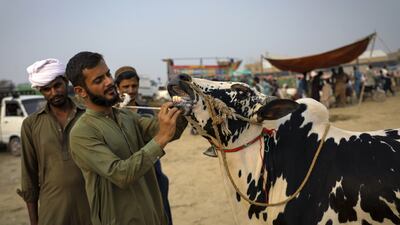In the crowded livestock markets set up ahead of Pakistan's Eid Al Adha festivities, shoppers this week scrutinised cows more closely than normal, looking for the ugly tell-tale signs of a devastating infection.
An outbreak of the pox-like lumpy skin disease is sweeping the nation's herds, killing or emaciating cattle and threatening ruin to farmers.
Hundreds of cattle have been killed and thousands infected, as livestock owners race to vaccinate animals before the virus spreads further.
The disease cannot spread to humans, and doctors say the meat of infected animals can still be eaten if properly cooked, but its emergence has spread alarm among buyers and sellers.
Prices of animals with proof of vaccination have risen, but many worried shoppers have switched to buying goats or sheep to celebrate the feast of sacrifice. The prices of these smaller animals have also increased.
Muslims prepare for Eid Al Adha — in pictures
Naqeebulah Khan, a resident of Peshawar in north-west Pakistan, said he was one of those who had opted to buy a goat this year, steering clear of cows.
“We bought two goats. A livestock expert accompanied us and he examined both of them. The prices are higher than normal, but we are sure they are healthy.”
Mr Khan said he had tried to stay away from livestock markets this years, which he claimed were “thick with lumpy skin disease-hit animals”.
What should be one of most profitable times of the year for cattle farmers has instead seen them left with unsold animals and facing heavy losses. Dairy farmers cannot sell their milk.
The virus is transmitted by blood-sucking insects or ticks and there have been worries it will spread more quickly among cattle herded together for Eid markets.
Cows infected with the disease develop the lesions that give it its name. They rapidly lose weight and milk productions plummets. Some die.
At least 97 animals died and 1,500 were infected on Wednesday alone in the northern province of Khyber Pakhtunkhwa, said Alamzeb Khan, director general of the local livestock department. Vets have vaccinated about a quarter of a million cattle, but that is only a fraction of the nearly nine million in the province.
Muhammad Shakoor, a cattle dealer in Bannu district, told The National he had lost eight of his herd of 70, after buying them in Punjab province.
“The people aren’t even paying the amount on which we bought these animals. The people are extremely scared because the media is replete with the news regarding the outbreak of lumpy skin disease.”
Muhammad Sultan, a resident of Mathra locality near Peshawar, said the disease was costing him and his fellow animal traders a fortune.
“Buyers are examining every animal before purchasing them,” he said.
He said he had invested 10 million rupees ($48,200) on buying animals to sell at Eid.
livestock trader
“But the people aren’t coming to the market as they used to in previous Eid. Last year, we earned two million rupees but this time around we have lost that, or even more.”
Lumpy skin disease has long been common in parts of Africa and the southern Middle East, but in 2012 it began to spread much more quickly, said Dr Pip Beard, an expert on the disease for the animal equivalent of the World Health Organisation.
The virus swept further afield into southern Europe, Russia, Turkey and Asia and is classed as a “rapidly emerging, transboundary pathogen”, she said.
“It causes very serious disease,” she said.

It is unclear why the virus suddenly spread from its normal haunts in 2012, but she said researchers were investigating whether the turmoil of the 2011 Arab uprisings might have caused a breakdown in veterinary services.
Pakistan's recent flare-up has also spread to neighbouring Afghanistan.
“I keep 70 to 80 animals in a farm. Among them, 10 or 11 have died due to this disease,” said Nazar Muhammad, a farmer in Afghanistan's Khost province.
The lumpy skin disease cannot infect people and it is a stable, slowly-evolving virus which means it is highly unlikely to mutate into something that could jump into humans.
Nizam Ali, also of Bannu district, predicted the outbreak would have a significant effect on the celebration of Eid Al Adha this year.
“We used to sacrifice a cow on Eid every year and divide its meat in three parts. One for own consumption, one for close relatives and one distribution among the poor people as per Islamic formula. But this year, more people are opting to have small animals, which they would eat themselves. It will be hard to divide the meat of a goat in three and distribute among the people,” he said.


















































